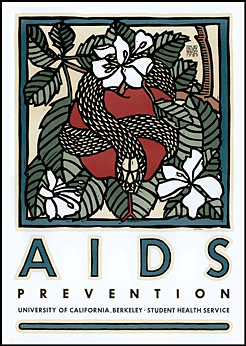
Click on image for detail
(#119) AIDS PREVENTION:
Edition of 2026 of which 300 copies are signed 1-300, 26 are signed A-Z as artist's proofs, and three sets are signed as progressives.
December 13, 1985 7 colors 17" x 24"
Client: James R. Brown, M.D., Director, Student Health Service, University of California, Berkeley 94720. Telephone (510) 642-6621 A-Z: Artist's own use Progressives: One set to the Student Health Service, Cowell Hospital, UC Berkeley
(ART, SCIENCE AND POLITICS IN THE SERVICE OF PUBLIC HEALTH; Caduceus, Volume VI Number 2, Summer 1990; Department of Medical Humanities, Southern Illinois University School of Medicine; Reproduced as the cover illustration for the proceedings of the conference AIDS and the Historian, National Institute of Health, March 1991; National Museum of American Art, Smithsonian Institution, "Posters American Style" exhibition and catalog, March, 1998.)
Logic leads us to surmise that small actions should have small consequences, and large actions, large consequences. If you drop an atomic bomb on a city, this should alter the course of history for millennia. If you sneak a bouquet of flowers past customs, this should have no appreciable effect on anything. Logic, alas, is a human construct, and the consequences of small actions can be out of all proportion.
Between 1985 and 1987, a tag-team of Asian mites got past the Golden Door and made it their business to infest Apis mellifera, the industrious honeybee. Honeybees themselves were imported by European settlers in the mid-seventeenth century, and immediately put a serious strain on the ability of bumblebees, leaf-cutter bees and the like to make a living. These endangered insects' patience and longsuffering, however, has been rewarded with the near-extermination of honeybees in America. Native pollinators are in great demand all of a sudden, and "help wanted" signs are out in front of every field and orchard.
Honey and beeswax are going to be harder to come by in future, and certain metaphors and similes may also lose currency. "Son?" "Yes, Dad." "Let me tell you about the birds and the bees." "All right, Dad." "Son. They're both extinct. And so will you be if you don't wear a condom." "Thanks, Dad. I'll remember that."
Must have been a slow news day. The TV people decided to whip up a "lets you and him fight" over this poster, based, near as I can determine, on a casual remark made by someone who remained nameless, that he didn't care for it. Or perhaps he knew someone who didn't care for it. I never was quite sure. So the news cameras came over and crammed microphones in my face and I said things like "art is a mirror," which is a polite way of saying "you're another."
The whole tempest in a teapot blew over of course and the poster went on to publicize aids awareness which was what it had been intended to do in the first place, not to provide canon fodder for bored reporters. But, as we poster designers often tell our clients, especially when things don't work out as we'd hoped, "all publicity is good publicity." Say anything you want about me as long as you spell my name right.*
* Attributed to Huey Long.